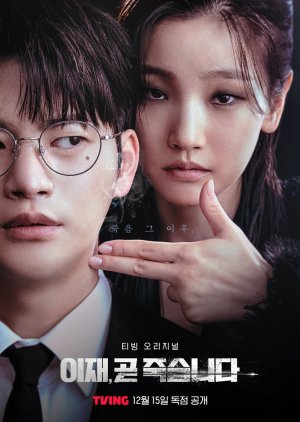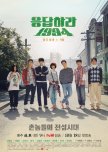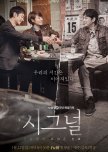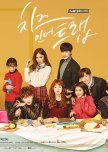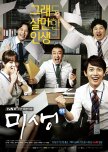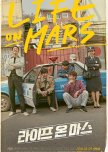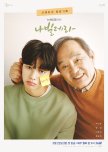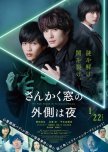Esta resenha pode conter spoilers
An Unexamined Life
A young graduate (Seo In-guk) doing it very tough in the existential scramble for jobs, has come to the end of his tether. After several years of juggling part-time jobs and not achieving that holy grail — a corporate position at Taekang Group — he concludes that his life has been an absolute failure. From the top of a high rise, he takes the plunge, ends his life, leaving behind a loving single mother and his longtime ex-girlfriend. It is important to note that his despair is exacerbated by a particularly bad day that culminates in a break-up with his girlfriend which he initiates after seeing her with another man. One thing after another he believes that his death is the solution to all his problem and will end all the agony that paralyzes him. That is until he wakes up and finds himself in a kind of purgatorial location face to face with Death herself played by a suitably menacing Park So-dam. This begins a drawn out debate between Death and our protagonist about the value of his life and life in general.I went into this not knowing much except the bare essentials and on hindsight the surprises increased my engagement with the plot. The element of surprise pumps an extra layer of enjoyment as there are plenty of thrills in the offing especially in the first 4 episodes aka Part 1. Be warned: It’s not for the faint-hearted. The crime elements are unyielding in this and there’s bloody violence all about in precarious situations. If violence is no barrier to entry, this can be an amazing adrenaline rush as the viewer embarks on this seemingly convoluted journey of discovery with Yee-jae who reluctantly… and often defiantly takes on each challenge to prove his case.
From the perspective of a seasoned viewer, it’s undoubtedly one of the more creative K drama endeavours I’ve seen in awhile. The plotting here is everything. On the surface it appears to be just another one of those transmigration stories that have become K drama staple but from the way it blends genres, it’s a superior work of art to all the others.
The other highlight has got to be the top tier cast. Plenty of familiar faces and the director certainly used the best of the best to optimize the storytelling. It’s also good to see the underrated Kim Ji-hoon getting a lot more work these days in these bigger high profile productions. But the star of the enterprise is the script begging the question... when was the last time a K drama had plotting this good?
My analysis — best read after viewing and not before… Spoilers ahead.
Somewhere between the third and fourth episodes, it occurs to me that Death’s Game is a darker, certainly more violent reimagining of Frank Capra’s It’s a Wonderful Life. And while we’re at it, why not throw in Charles Dickens’ great classic, A Christmas Carol for good measure? We know which inspired which there. So what do these stories have in common? For one they are second chance stories but the protagonists in these stories aren’t necessarily aware that they are being offered a second chance at the start. They undergo an arduous punishing journey of self-discovery that on the surface is more excruciating than edifying. If Death is to be believed, then Yee-jae is being punished for committing suicide.
But is he, really? Should we really take Death at face value or are her threats strategically made to egg him on to play the game game and force him out of his despondency? Is she manipulating him with reverse psychology. Hell awaits if he fails and it’s a terrifying thought now that he’s seen what it looks like. If punishment is really the endgame, then why take Yee-jae on this journey to solve a matter of grave injustice but to give him a glimpse of what’s life like for those who are left behind? If he was the burden he believed himself to be, why are his mother and ex-girlfriend, Ji-su still grieving for him?
Because the first “body” belongs to the second son of Taekang Group, it signals immediately that these challenges are somehow linked to Yee-jae’s life before death. But how do these pieces of the puzzle fit together? Why can’t he see the forest for the trees? Corporations in K dramas are seldom portrayed positively and yet it seems to be the dream of every university graduate to seek employment in these detached monoliths. Yee-jae attends two interviews at Taekang. The first is a write-off as a result of his encounter with a suicide victim on his way. In the second seven years later he interacts with Park Tae-woo (Kim Ji-hoon) the oldest son and CEO of Taekang Group and mistakenly assumes he has had a positive encounter with his potential employer. It’s an illusion. One of many. Park Tae-woo is a double-faced psychopath with violent tendencies. He’s a fraud. His benign public image is a cover for something far more sinister. He uses his clout as CEO of a corporation with deep pockets to pay off corrupt officials to cover up his crimes. He can use his infinite resources to engage organized crime. He sets himself above the law. He styles himself as Milton’s Satan ruling in hell. No one can get to him. Except through a miracle.
Furthermore the purpose of Taekang Group in the narrative is not only that it represents a festering merciless evil behind the facade of wealth but it is a symbol of a larger critique of materialism that drives the rat race and the participants to despair. The society in which these people live define success in terms of wealth, status, possessions. Yee-jae mentions this more than once that everyone has the same goals — a good job at a large company, marriage, children who do well at school, financial security. The reality however is that not everyone can achieve all of this. Nor might they want to. It is in the interest of these corporations with the help of governments to turn men and women into economic units — slaves of a system that tethers them to the economic engines of the nation with no regard for their spiritual, mental, physical well-being that make up the whole person. Big Business is first and foremost about profits. Governments are about control. They don’t see their clientele or electorates as individuals but entities to be exploited managed.
This perspective is given added merit by the fact that when Yee-jae finally realises that the people around him are more important to him than clinging on to wealth that’s not even his, he finally has clarity about the nature of Death’s game. It isn’t punishment per se but revelations/insights into his life that were not available to him previously. These insights serve a dual purpose insofar as they offer him an opportunity to re-evaluate his life and a compelling reason to exist. He didn’t have much by way of material wealth. In the order of things he was a “nobody” but he loved and was loved. His life had value by virtue of the fact that he was born.
In his case Yee-jae’s depression arose from unrealistic, unhealthy social values that just don’t account for individual differences and the unpredictability of life. Working for Taekang isn’t that pot of gold at the end of the rainbow but it has become a lie perpetuated in his world to prop up a class based social system that devalues the “losers” based on their monetary value. This is also reiterated in the other highlighted suicide where unlike Yee-jae, the individual makes it at Taekang for a while and lives the South Korean dream only for the bubble to burst in middle age when all his accomplishments and attempts to climb up the corporate ladder are rendered meaningless in a single moment. The problem with material possessions is their transience and lifelong pursuit of them is meaningless. Our ability to cling on to them in life is tenuous at best. And no can take it with them when they die.
At the core of this is the question of what makes us human. Are we just mere bodies to be “filled” by a soul? Are we just a sum of our memories? Like in Neo in The Matrix, Yee-jae is able to “download” abilities ie. access the abilities of his “hosts” and use them for a far greater purpose that transcends the lives of any of these morally dubious men. He is able to co-opt their memories for a greater cause — justice for victims of heinous crimes.
Hence the analogue to It’s A Wonderful Life and to a lesser degree A Christmas Carol. Instead of Clarence the angel or the three Christmas ghosts, Yee-jae’s instructor and messenger is the hard task master Death who brings out the whip and cracks it with unholy glee to keep him on his toes. As with the case in these second chance stories, these men come to realise that material prosperity isn’t everything but the relationships, the people we leave behind when we die are the true legacy of our lives. It’s not punishment at all but compassion to be shown how you’ve been led astray and be given another chance to refashion one’s life not governed by the materialistic impulses of our culture.
Esta resenha foi útil para você?

So Good, It'll Make You Want to Live... Forever (Just Kidding)
As I started watching the second part of "Death’s Game," I carried with me a mix of anticipation and apprehension. The first season had set up an intriguing premise but stumbled in its execution. I hoped part 2 would build on the foundation and address the issues that held back its predecessor. However, my excitement started to wane after episode one. The quality of the narrative took a sharp downturn. Episode two felt like it belonged to a different series altogether, resembling a generic crime drama filled with exaggerated corruption and untouchable chaebols. The over-the-top acting and simplistic resolutions left me feeling disappointed.The most problematic aspect of this part was its handling of the suicide theme. The last two episodes, in particular, hammered home a singular message: suicide is selfish, and one should endure suffering for the sake of others. This approach felt incredibly narrow and, frankly, irresponsible.
One part that did stand out to me was the story of the suicidal salaryman. This narrative arc shed light on the harsh reality of the societal and governmental pressures in South Korea. It was a brief yet poignant exploration of the protagonist’s disillusionment with the dream he had been brainwashed to pursue. However, the show didn’t delve deeper into this critical insight. Instead, it reverted to guilt-shaming the main character through his interactions with his mother, missing a crucial opportunity to explore his true desires and struggles.
As someone who values a comprehensive approach to storytelling, I was frustrated by the show’s failure to address the root causes of the high suicide rates in South Korea, such as poverty and unemployment. Instead, it seemed to push a government-endorsed narrative, urging viewers to endure suffering for the greater good. This approach felt like a cheap shot, especially when considering the complex realities of mental health and personal agency.
The show’s narrow perspective on suicide was particularly infuriating by the end. It didn’t explore the mental health states of suicidal individuals or the various circumstances leading to such a difficult decision. For instance, while the main character had a caring mother and a girlfriend, their lack of support when he needed it most was glaring. His mother’s revelation about hoarding money that could have helped him years ago added to my frustration. This aspect of the story felt underdeveloped and missed the mark on addressing the protagonist’s real-life pressures.
I found it difficult to connect emotionally with the characters. While the cast delivered strong performances, the relationships and dynamics felt superficial. The main character’s relationship with his girlfriend followed a clichéd template, and their interactions lacked depth.
The ending left me feeling conflicted. While the main character got a second chance at life, it seemed to invalidate everything he experienced in other people’s bodies. The deaths that were supposed to happen would still occur, and the villains remained unpunished. This resolution felt hollow and unsatisfying.
Reflecting on part 2 of "Death’s Game," I’m left with mixed feelings. The production quality and cast were superb, but the controversial message and disappointing ending overshadowed these strengths. The show had moments of brilliance and potential but ultimately fell short due to its flawed execution and narrow-minded approach to sensitive topics.
Part 2 of "Death’s Game" attempted to explore profound themes but was marred by controversial messaging and missed opportunities. While the quality of the production and the cast’s performances were commendable, the series failed to deliver a satisfying and thoughtful narrative.
Esta resenha foi útil para você?

Esta resenha pode conter spoilers
The game continue...
This drama leave a strong impression in the first part. And for me this drama end it with strong point. With a little dissapointment in the end...After Choi Yi Jae (YJ) learn the thread that connect all of his 'death' he started to plan for revenge & plan everything carefully... With the plan he also unravel the big conspiracy & corruption in the police department & other important government department. Make 'him' quite important for the public.
But the reality hit him hard when he dead once again & Death asked him: "Who is he...?" Yeah... In the end whose people recognize for doing all the stuff is not YJ himself, rather the 'man' he became. And after that everything start to collapse again & make YJ doubtful & once again don't give a sh*t about his life.
YJ only start to really think about everything in the last 2 of his chance. When everything became so interesting to watch.... And in the end he finally understand what Death mean by my death remained behind with those who loved me.
By reading other review I also realize this controversial topic to begin with. With no mean to minimize all people that have depression & think about ending their life. I think this drama deliver important messages for them too... "As i disappeared from this world, my death remained behind with those who loved me"
Esta resenha foi útil para você?

Masterpiece!!!
I just finished both seasons and i am amazed. Just watch 1 or 2 episodes and trust me you will not be able to keep it and watch it later.It is so amazingly addictive. I loved the cast. The cast was like as if the characters were made just for them.
It’s a good to watch drama, masterpiece with an amazing message, more like an anti suicidal drama.
Esta resenha foi útil para você?

Don’t take anything for granted , not even your death
Second part is an emotional ride. Glad I watched this drama. I can’t believe this work is from the same director of “the sound of your heart”.some shots are beautiful but sad at the same time. Every actor did a great job. Oh Jung se did beyond the great acting as he always did before .This is not just a drama but a lesson or a mind changer for all the people who are suffering with depression or having suicidal thoughts. Sometimes we ignore the helping hand or opportunity while indulging in our own depressive thoughts. I’m really thankful to the team for bringing this project to everyone.,as it may save at least one person who watched this. Death really gave us great lesson in this drama. Don’t ever think that death is merely a means of ending the pain. The pain will always passed on to the living..
The last episode really did squeezed my heart though.
Esta resenha foi útil para você?

A Drama that SHAPED my Life :-)
LEARNING has no End !!!At any stage of Life , each and every second , from each and every being , We can learn something .
I am a person who believes in that.
So I always questioned myself -
"What did I learn from this drama ?"
"What did I learn from this situation ?"
"What did I learn from this person ?"
"What did I learn from my Experience ?"
"What did I learn Today ?"
etc. etc.
But never ever,
Not even in my dreams,
Even for once,
Did I question myself -
"What can we learn from DEATH ?"
This DRAMA has taught me that !!!
.....................................................................................
I always heard and believed -
"We get to live only once ! "
Never did I think about -
"We have to DIE only once - was muchhh more of a blessing than living once ."
.....................................................................................
Although this drama talks about DEATH
I'm really really grateful for giving it a watch .
Because it taught me - " THE VALUE OF LIFE !!! "
P.S.- Also , It's hard to Rewatch it , because It's not a drama you can forget easily ;-)
Esta resenha foi útil para você?

Esta resenha pode conter spoilers
LIFE… IT IS DEEPER THAN YOU THINK.
The story at the start seems like a simple thriller in which a man is given a challenge by death itself after he took his own life to escape the problems of his life (quite a common act nowadays). Though this series starts out as being a thriller it smoothly transitions to talking to us on an entirely new emotional level. It does not just pop into a moral lecture it slowly comes together and talks about the results of death and how foolish it is to take one’s own life.As a controversial topic, I do agree that the ending was unsatisfying, but I will forgive it. As someone who themselves have a history of self harm and attempts, I enjoyed this. I have been given life lessons on the topic more than a few times but the talk is always a talk, forgotten easily. So watching a drama which so sneakily explores this topic was refreshing, at no point in time did I feel like I was being lectured but after the end when I think back I realise, I wasn’t just being told a story, I was being told a life lesson, hidden behind a supposed murder mystery and revenge.
An unforgettable journey, An unforgettable show and finally A must must must watch.
Esta resenha foi útil para você?

"내 죽음이 참을 수 없이 부끄러웠다".
Are there ANY lives not worth living? Any at all?🔸️In comparison to Tomorrow that could only offer the cliche "tomorrow will be better" and more or less noticable victim blaming for giving up on your life, Death's Game, on the other hand, acknowledges the personal struggle and responsibility while encouraging you to continue fighting, to win this horrible game and rise from the ashes. Because while you continue living, you are already winning each minute of your life.
It's interesting to watch one actor playing several characters in one show, but to watch several actors playing one character together? All the Yi Jae cast had to layer Yi Jae's nature and behavior on the host personality, the owner of the new body. This task is exciting on its own, and the acting turned out phenomenal. Kim Jae Wook playing psychopath rival? That scene gave me chills, let alone the brilliantly adapted screenplay.
🔺️Watching the drama won't help severely depressed and suicidal people. And of course it's not meant to do that. If you're in such condition, please, try seeking help from mental health professionals.
But it can and does help those who are struggling. It killed me and put me back together piece by piece, just like Yi Jae, in the final. Immersive af.
Did you know? The name Yi Jae sounds identical to "right now" in Korean. I enjoy so much the wordplay in character names in K-dramas.
Esta resenha foi útil para você?
Esta resenha pode conter spoilers
Why what his drama split in two?
I reviewed the first half of the drama, and it was for the entirety of the drama. So, here, I'll give the Cliff's Notes version of my thoughts.My recommendation would be watch it and decide for yourself, since everyone seems to have loved this drama. My rating is based on my feelings and does not reflect the actual quality of the drama.
Excellent cast. If you've been watching Korean dramas for any period of time, these faces will be familiar to you. I would have liked for some of the stories to have been more in depth, to develop the characters a little better. This drama was a Who's Who in drama land.
The concept was interesting. Some people had a problem that it seemed to be an anti-suicide PSA, but to me it was more about how choices we make affect others.
My biggest problem with this drama was the overabundance of violence. Many of the characters were not well developed, because of the number of bodies that he inhabited in eight short episodes.
But again, I will say, this is all just my personal opinion. Watch it, you'll probably like it.
Esta resenha foi útil para você?

Good Enough
Korean Drama '' Death's Game '' is a webtoon adaption of an action packed story.The drama has multiple layers, as it goes from a melodrama, to a tragic love story, to a family emotional drama, to a murder mystery, to a fantasy philosophical story. And, as it follows multiple stories, it provides the main plot with many elements that come together in the end.
And even though the start of the story is hectic, the drama settles to its rhythm in the episodes to come, giving the story a nice and original ending and plenty of emotional scenes.
Finally, the performances were all great by everyone in the cast.
So, overall, eight out of ten.
Esta resenha foi útil para você?

Esta resenha pode conter spoilers
broo this had me mad crying... ugh jisu dying rly put me over the edge.... DAMN ok like i get how the message was like dont kys ppl love u youll regret it but like sjfkjashfkha i didn't relaly like the way they showed it. it was cool, THE CAST WAS STACKED!!!!! and i loved seeing all my fav actors. it was just so emo lmfaoisjoijoi!!!!!!!!!!!!!! 🥲im crying rnnn.... kinda predictable that the mom woul db e last. i like how it was all full circle... but that murderer guy??? that was weird. but yeahhhhhhhh so emo stuff. JISU IS SO SWEET I LOVE HER AND THE MOM. great great acting. not a def fav, but pretty good Esta resenha foi útil para você?

Esta resenha pode conter spoilers
Nothing different but good enough for what it is.
- Will review the drama as a whole (including S1)- Will have some "social commentary" so if you're not into taking things too "deeply" this isn't for you.
This is my first review. I was compelled because of the main subject matter of this show: desperation leading to suicide.
Let's start at the opposite end.
1. Rewatch Value
It may be good to rewatch to see clues but personally the show is too heavy to rewatch so I gave it a passable 7.0.
2. Music
It was excellent especially the scenes with the main antagonist. It really made me feel like he was dangerous.
3. Acting/Cast
I liked the idea that we have the true protagonist (Seo In Guk) but he rarely shows when he is in the body of someone else. Most of his scenes were either flashback or with Death. In this way, it showcased the acting chops of the other actors (his reincarnations), who portrayed their parts excellently. Special props to Yoo In Soo. He played the pathetic bully to a tee. I love that he can play antagonistic (All of Us are Dead) and comedic (Good Bad Mother) roles very well. It really shows his range. Also, Kim Ji Hoon, who played the main antagonist. Roles like that really make me want to play villain roles even though I'm not an actor.
Mind you, even though Seo In Guk's scenes were mostly with Death, he was still able to portray his party extremely well. When he was laughing after being killed by Park Tae Woo, I really felt how good he was. I was having a slump with good-looking yet not very skilled actors recently, but he brought me back to believing in Korean's acting skills which I was impressed by when I started watching Kdramas. I used to be apprehensive because I thought they were all handsome/beautiful faces with no substance, but I was proven wrong before.
Now on to the main portion of this review.
4. Story.
I liked it for what it was. But it was nothing new. Plenty of stories like this have been told with that end in mind---for the protagonist to realized what he/she did/thought wrong and they are always wrong in them. Other tropes/gimmicks of this kind are 1. body switch stories wherein the two people in misunderstandings get to understand each other; 2. I wish I was never born stories wherein a spiritual being of some kind will help the MC realize that he/she was actually loved all along or that his/her life wasn't that bad. And while stories like this have good intent and have a place in media, it is overtold and lacks nuance. The end goals of these stories are "What about them," which is the case in this story. It shows, yet completely glosses over the pain and troubles that the MC goes through because "What about them."
In the case of this story, it (and major spoiler here though it wasn't really a big twist) was about his mother. What about her struggles and what about her love. The whole point of the story was Death, who I believe wasn't sadistic but only trying to teach him, was to make the MC realize that he was too caught up in his issues to see who could be hurt with his passing. In as much as I appreciate the value of that in storytelling and as it relates to real life, (because stories are made to relate to real life and say something about it no matter how fantasy-oriented the story is) it, just like other stories, have always been "But what about us," completely failing to fully recognize the plights that the MC experienced. Yes, it showed us his trauma and his messed up state of mind, yet it completely was disregarded that in favor of other people. By no means am I saying the emotions of the people we have relationships with don't matter, but ours should be as equally validated.
This, as I said, related to real life. Often times, those going through a tough time or those with mental health issues or trauma are told to just suck it up because what about other's feelings or because others had it worse. Their feelings are not validated and they are guilt-tripped. They are expected to be better without help just because "what bout them." I recognize the fact that the MC wasn't given a diagnosis or depression or whatever, but it was still shown that he wasn't in a healthy state of mind. What healthy person, who studied in a prestigious university, goes SEVEN YEARS without a full-time job? Yet he was still blamed for his final act of desperation (taking his own life). I have heard it many times in real life as well. "They were selfish, they never thought about how we would feel." My thoughts were aren't you selfish for failing to recognize the desperation your loved one must have felt to do what he/she did. I personally relate because I had an uncle who did the same. All that came out of my mother's mouth were that he was selfish and he didn't think about them. Not once did she say what could she have done to help him. These stories always fail to acknowledge that the MC's were truly desperate and feel like there's no way out. Not to justify what they did and not to say people will not get hurt, but to just understand and empathize without saying they were wrong or selfish.
These stories also often fail to acknowledge the shortcomings of those around the MC's and mostly center on the MC's shortcomings taking the form of "They were selfish." In this case, the mother and to an extent his girlfriend's failures weren't truly under the spotlight, only his. Actually, only the GF's was really shown on one scene when she told him couldn't he just try harder. It was as if he wasn't for all those years. Mind you, I don't consider neither the mother nor GF to blame nor to be awful people. It was just portrayed that they were such lovely people while diminishing the loveliness and thoughtfulness of the MC himself. Sure it was shown he was sweet in the form of the pen for his GF and the shoe for his mother, but it wasn't such a big highlight as their love and sacrifices for him was.
Going back to the mother, her failures were never shown. She was this overwhelmingly good force who only loved her son the best she could. And she did. But this not take away from the MC's own desperation. Sadly, Death could not care less about the MC's own feelings. If his mother truly was this paragon of motherhood, how was it that she allowed her son to get to such a low place? Again I am not tainting her. My point is just to keep both sides into perspective not to justify, not to side with, just to understand and empathize which these kinds of stories never really do. It is always how dare you! Your pain and desperation does not matter. You are selfish for not thinking about them when you are in such a low place. I wish their would be more stories that took a more "balanced" approach to these kinds of stories, not to blame but to seek to understand.
To add to this, I saw a comment saying these kinds of parent-centric storytelling are often based on culture. I agree. I am also an Asian in a parent centric country wherein even if the parent actually does you harm (unlike the MC's mother) you must still respect, love, and repay them for having you.
That was the end of the "social commentary" part. Now on to some loopholes or things I found weird.
a. Why did he live in his mother's body for 32 years to keep her alive? Didn't Death already say that when he goes into someone else's body, they were already dead. So isn't it pointless for him to say that because she was already dead by that point. Though I understand it, sort of, from the point of repentance. It was him punishing himself. If that was the only reason it seems slightly acceptable, I guess.
b. When did she die? Did she die 32 years after already and he was returned 32 years prior (because it was shown Death can return him to 7 years earlier) or did she die recently? I know it doesn't really matter but I wonder if his death lead to her dying soon as well.
c. His memories were inconsistent. With some characters he only knows little about them. Like he didn't even know his model reincarnation's brother. But in some cases, he knew everything when it was convenient. That to me was an odd choice. Like he suddenly knew what his other incarnation's were up to so he could capture the antagonist and he knew his mother's whole life too.
d. How did he not know his girlfriend's big brother? I think someone said they dated for 3 or 4 yrs? I didn't really care to read that part. Social media is so popular in South Korea and hello even if he didn't have one, didn't she show him a picture of her brother to him?
5. Overall Score: 8.0
I actually rated it a 9 in my own list because the story made me want to finish it as soon as possible, but I wanted to be more objective in this review because this story really isn't anything different. Regardless, I was having a slump finishing dramas recently but I actually didn't drop this one. I also liked the shifts in tone. It was very well done; it wasn't weird; it made sense. It goes from dramatic and depressing to thrilling and action packed to wholesome and lighthearted and back to dramatic. I also liked that the end he was reincarnated to his mother's body. In the end I was thinking hmm will his last be his own body so he can change things, since he was reincarnated into the man who killed himself, but when I thought about it, that was too easy. Still, it wasn't a major shock. I knew they wanted a "twist" of some sort. Everything was leading to it after all so there was only one other body he could end up other than his own. They tried to hide that by only making him incarnate into men's bodies. In addition, I thought that it was nice that they were trying to mislead us into thinking that he was being punished because he killed someone else when he feel from the roof. I liked how that was done. But I did realize how easy it was to see how absurd it was that he had a photo of himself when he jumped. They also tried to add to this the man whose daughter was killed in a hit and run to confuse us even more. Still, Death, itself, wasn't very vague when it was trying to tell him about his fault. It really was just about the people he left most especially his mother.
Overall, it's one of my favorite dramas. But I'll never rewatch it alone because it's too heave like Hi Bye Mama which coincidentally stars Kdrama's Mother too. Hopefully in the future there will be more nuanced stories of this kind.
Esta resenha foi útil para você?

